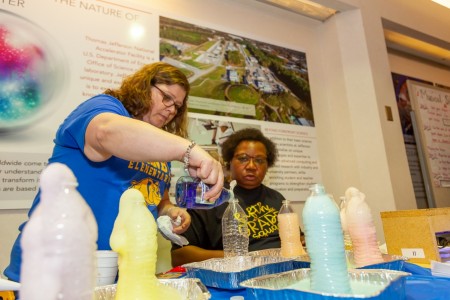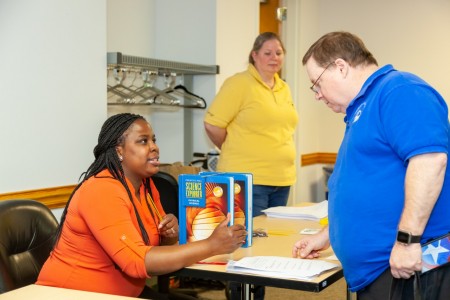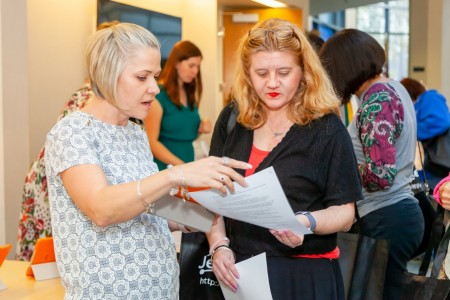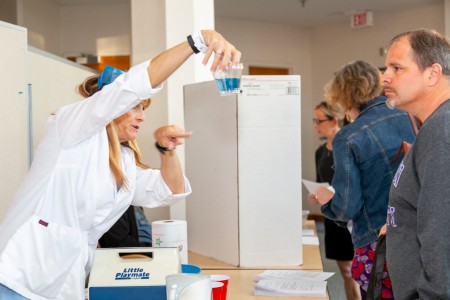JSAT Teachers from across Hampton Roads, Virginia share science experiments and lesson plans with local teachers during Jefferson Lab’s Teacher Night.
Leave the tired baking soda volcano experiment at home! Earlier this month, more than fifty teachers spilled out of the Jefferson Lab auditorium and into the atrium ready to share new, innovative and accessible science-based activities with fellow science teachers.
“It’s like a science fair for teachers!” organizer and Jefferson Lab Science Education Team Lead, Lisa Surles-Law said of the 12th annual Teacher Night. The presenting instructors have nearly completed the Jefferson Lab Science Activities for Teachers course; a program open to Virginia teachers and sponsored by Jefferson Science Associates Initiative Fund. For 16-sessions during the school year, JSAT teachers were given STEM-focused ideas, activities and projects to take back to their respective classrooms. Teacher Night is a way they can share what they’ve learned during the course with other local teachers.
To kick off Teacher Night, Chief Operations Officer Mike Maier shared with the teachers, “It’s important to us to foster the next generation of science and engineers. At Jefferson Lab, we believe science education is incredibly important, so we want to help fund educators interested in making a difference in students’ lives.” STEM focuses on an interdisciplinary learning approach between science, technology, engineering and mathematics.
As JSAT teachers began demonstrating their experiments, guest teachers grabbed an informational hand-out and watched them work their magic; Play-Doh served as an electric conductor lighting up holiday tree lights; bioluminescence in rivers was taught via neon glow sticks and water temperature; sound waves were made relatable through notes emitting from varying sizes of PVC pipes. Excited discussions of teacher collaboration, student engagement and lessons learned filled the air.
“You can see the light bulb go off in their head as things start to click,” Saundra Davis, teacher at James Hurst Elementary School in Portsmouth says. “It’s a way for the students to make a better connection and have fun with science,” Emma Ingram, of Granby Elementary School in Norfolk adds.
The 2018-2019 course register topics include energy transfer, watershed and optics, force and motion, magnetism and electricity, atomic structure, waves and sound, simple machines, and matter. With every JSAT class, supplies used to recreate the experiments in the classroom are provided so teachers don’t have to reach into their pocket. “It’s really helpful that materials are supplied,” Lindsey Gibson of James Hurst Elementary in Portsmouth shared. Ingram and Davis agreed.
As the evening wrapped up, it was evident there was a sense of community and sharing among the teachers who were enrolled in the course, with Surles-Law’s earlier comments seeming especially pertinent: “Once you are part of Jefferson Lab, you’re always part of Jefferson Lab. If you ever need anything to improve classroom learning, you can come to us.”
To learn more about the JSAT program, visit education.jlab.org/jsat.





